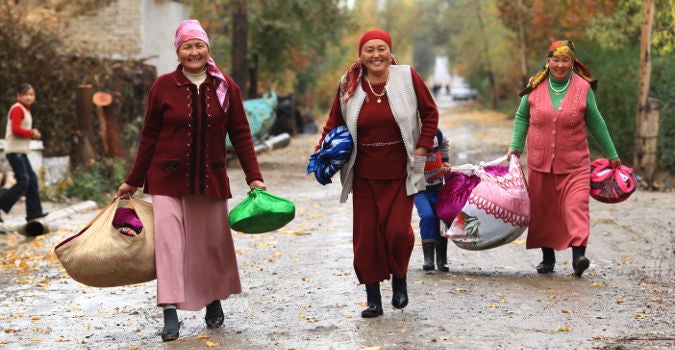Where we are
 Photo: UN Women/Janarbek Amankulov
Photo: UN Women/Janarbek Amankulov
Europe and Central Asia is a large region, diverse in language, culture and religion. Since the dissolution of the Soviet Union and Yugoslavia and exacerbated by the global financial crisis of 2008, austerity measures have disproportionately affected women and girls.
Economic inequality has risen and large portions of the population live on less than USD 5 per day. Throughout the region, women’s wages, pensions and labour market participation rates are lower than men’s. Pervasive traditional gender stereotypes prevent women from equal participation in political and economic decision-making, while gender-based discrimination means that women are often victims of domestic abuse, sexual violence, border disputes, human trafficking and child marriage.
Not all countries in the region have a national gender equality support mechanism and those that do often lack adequate resources to implement needed changes.
The UN Women Europe and Central Asia Regional Office was established in Istanbul, Turkey in early 2014. It provides support and oversight to Country Offices in Albania, Bosnia and Herzegovina, Georgia, Kazakhstan, Kyrgyzstan, Moldova and Ukraine. In addition, the Regional Office directly supports programme and project presence in Kosovo (under UN Security Council Resolution 1244), Serbia,The Republic of North Macedonia, Tajikistan and Turkey.
All human development and human rights issues have gender dimensions. UN Women focuses on priority areas that are fundamental to women’s equality and that can unlock progress across the board. In Europe and Central Asia, we focus on these main areas of work:
- Working with national governments, civil society and international actors to promote women’s leadership and political participation in all spheres of life
- Enhancing women’s economic empowerment to promote women’s ability to secure decent jobs, accumulate assets, and influence institutions and public policies
- Ending violence against women and girls by tackling root causes to prevent violence, raise awareness of its causes and consequences and ensure gender-sensitive protection services for survivors
- Enabling women’s participation and influence in all aspects of peace and security and humanitarian action to prevent and resolve conflicts and ensure that women have access to justice and are protected from discrimination and human rights violations
- Advocating for transparent national planning and budgeting that provides adequate public financing for gender equality and adopts gender-responsive budgets that channel adequate resources to both women and men providing intergovernmental support so that Member States can act to meet their international commitments and implement key gender equality norms and standards
- Providing technical support to UN country teams and UN system coordination to strengthen effective UN action on gender equality and women’s empowerment.